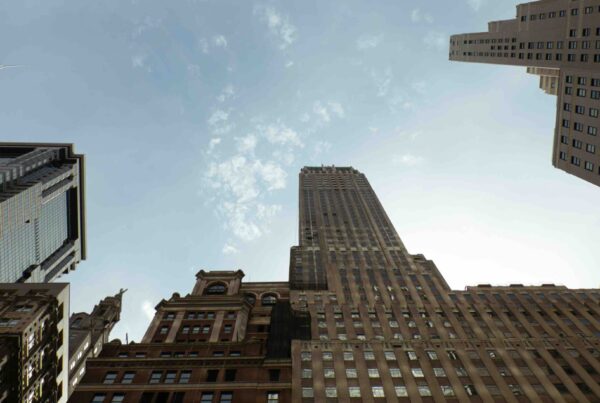People decide to sell real estate to solve a problem, capitalize on an opportunity, or realize a profit. Management fatigue is also motivating people to transact. Our team receives countless requests for opinions of value and often the client says, “I can’t sell at that price.” What I’ve noticed is that the people who are contemplating selling are looking for a mathematical reason why it makes sense. The math doesn’t look great, but that doesn’t mean you shouldn’t sell. We continue to sell rent stabilized buildings at negative leverage on behalf of sellers looking for greener pastures and to buyers who think today is a good time to place their bets.
I suggest to those debating between selling now or waiting, to assess the variables and formulate an opinion of how you think the future will unfold. I’ve had this conversation so often that I decided to write it out so the marketplace can have a blueprint of things to consider.
Rates & The Banking Environment
We’re all waiting for the Federal Reserve to start cutting interest rates, but rates are only part of the problem. Lenders have become incredibly cautious and have significantly changed their underwriting standards and terms. Higher debt coverage ratios, wider spreads, personal guarantees, and lease reviews have become commonplace. Lenders are now hiring reputable law firms specializing in DHCR review to analyze the legality of the rents. If there is too much overcharge exposure (even unclaimed) the banks are not willing to write the loans. The banks have started to look at the deals just like a buyer would. This makes all cash buyers significantly more valuable. Even when rates drop, these obstacles will likely remain.
Borrowers should be asking themselves the following questions. When do I think rates will go down, and by how much? When will my loan come due and where do I think rates will be? If the loan is due in 12 months and rates are then 5%, what will that mean for me? Can I pull money out, and do I even want to? To my point earlier, will the lending environment be better or worse when my loan comes due and what will that mean for the value of my property? Fast-forward to your loan maturity and envision your options. (I thought about this personally for my own investments but more on that later.)
Do I Have Tax Exposure Where I Must Do A 1031 Exchange?
Owners with high debt levels but a low basis are in a tricky spot. Doing a 1031 exchange requires you to replace all of your debt and all of your equity (you pay capital gains taxes on what you don’t reinvest). NYC sellers with 80% leverage at a 4% rate will find it impossible to replace their debt because the rates are up, and LTVs are down. Cap rates for almost anything outside of NYC are lower than what you’d be selling. You’re selling a headache and buying a dream (more on that later). The net result is you have to either come up with more equity for the up-leg or take less debt and pay some taxes. Selling your building with 4% debt at a 7% cap rate and buying a triple net lease at a true 6 cap with 7% debt isn’t exactly a no-brainer. But I argue that selling your 7 cap isn’t really a 7 – that’s if everything goes right – it’s more like a 4 cap on real numbers averaged over 5 years. The perception or illusion of selling a 7 cap has been a distraction for would be sellers. My job was much easier in 2015 when I sold buildings for 3 caps and the client bought a 6 cap and doubled or tripled their cash flow.
Clients waiting for rates to drop and prices to recover should be cautious that a rising tide lifts all boats. Consider how much pricing will rebound in NYC versus what your up-leg will do. Perhaps in NYC overregulation and compliance limits price increases to 5% but outside of NYC pricing rebounds 10%. So, you could be in a net/net worse position by waiting. I’m not sure how this will unfold but it’s a legitimate argument to consider.
Future Regulations & Compliance Costs
- Local Law 11 – For buildings six stories and up, the city mandates that the façade must be inspected and restored every five years and certified as SAFE. The latest cycle also requires you to take your toothbrush and scrub the rust off the fire escapes. This is no less than six figures every five years. For smaller buildings or those with lower rent rolls, $100,000+ every five years can have a dramatic impact on cash flow. As a result, sales of these buildings have been almost nonexistent or significantly discounted.
- Local Law 31 – The newest amendment to this bill states that by September 2024 you must test for lead in every unit and if the XFR test comes back positive you must remediate. Remediation can cost $10,000 per apartment (common areas are now included in this bill). To my knowledge the process and system of how owners are supposed to report their findings hasn’t been published yet. I’m envisioning something like self-reporting your DHCRs. Insurance companies have been closely monitoring lead violations and lack of remediation could result in substantial premium increases or a complete drop in coverage on a renewal.
- Local Law 97 – This bill is aimed at reducing carbons emissions. At the moment standards for testing are ambiguous. Building size and percentage of destabilized units impact eligibility. Those subject to the bill will start to incur fines starting in 2025. Large, mostly free market buildings are the prime target for this bill. Even if you’re running a gas boiler, insulating your pipes will save energy and boost your score.
- Local Law 152 – This bill requires a gas line safety inspection every four years to ensure there are no leaks – exploding buildings make for bad press. This is almost always a nonissue in diligence but the cost to get back into compliance can be astronomical.
- Good Cause Eviction – This has been on the ballot for years and hasn’t passed but it doesn’t mean that it won’t. There is talk to pass GCE in exchange for reviving 421-a. How much this will impact valuations is unknown but if you’re a potential seller with free-market units you should consider pushing your rents to the max before GCE turns into law.
These are not suggestions for upkeep. Someone will have to pay for these eventually. When considering selling or waiting, ask yourself if you have the cash to comply, or if you think someone else will underwrite the work cheaper than you can do it. These regulations haven’t fully been priced into building valuations yet, but once fines start being issued that might change.
Future Cash Flow
I always ask clients: what does owning the building do for you? Not what it did; that’s different. But what does it do for you today and what purpose does it hold for you moving forward. Long term owners created more equity than they could have ever dreamed of when they initially bought the building decades ago but the reason you initially bought the building might be different than what the building does for you moving forward. Times change and clients who have recognized that and adjusted their thought process have been able to flourish by pivoting and adapting to changes in the political and economic environment.
So, ask yourself…does the cash flow of the building support my lifestyle? Do my kids want to get into the business and if so, do I think they are capable of thriving and growing? Give an honest assessment of the future cash flow. Do you foresee a path with NOI growth and if not, are you okay with that?
Vacancy Reset, IAI Comeback & RGB Increases
At the time of this writing, which is being published prior to the release of the upcoming budget, there have been rumors about ways to raise rents on vacant apartments. This would be fantastic for our industry and I’m hopefully optimistic that something meaningful passes. What it will look like is anyone’s guess, but anything is better than 1/180th capped at $15,000. The RGB hearings in June will look at data from 2022 which showed NOI grew at 10%. This is misleading because everything outside of core Manhattan and 421-a buildings actually lost money. I predict the RGB board will pass 2-3% increases on a one year renewal. Don’t forget to testify like I did last year! A meaningful housing deal will have different implications for development, free market units and rent regulated units. Internally process the results of the budget and add it to your list of variables.
ROH
Introducing… Return On Headache! My new favorite pricing metric courtesy of Shaun Riney’s restless brain. This is one reason why rent stabilized buildings are selling at a 7 cap, and triple net leases and free market buildings are selling at 6 caps or lower.
When considering ROH in the example above, I would argue that the spread should be much wider, leading me to believe that now might actually be a good time to sell that rent stabilized building; or cap rates for everything else should drop significantly.
A bigger migraine should be rewarded with higher cash flow. I suggest asking yourself… how do you want to spend your time in the future?
What I Did With My Own Investments
I ran through this analysis and thought process myself for two investments I had in New York City. I owned minority shares in two apartment buildings that in my view were going nowhere. The buildings are clean and there is nothing wrong with them except for the fact that they don’t really make any money, don’t throw out tax benefits and don’t show any signs of capital appreciation in the next handful of years. As my partners liked to point out, the only problem in the deal was me being a pest for the last 12 months trying to get bought out! Strangely, the longer this stalemate went on the more motivated I became because I didn’t want to be beholden to other people making decisions for me – I had no control. The general partners (who are good friends of mine) were gracious enough to buy me out at discounted valuations where it ended up being a good deal for both of us.
On one deal I got all my money back and on the other I lost half of my initial investment. The first one was an easy choice but the second one I had to sleep on and work through the questions that I’ve outlined for you in this article.
The rent stabilized building made a little bit of money but not enough to warrant monthly distributions. Buying a 6-month treasury bill would be more profitable. The 3.50% loan is coming due next year and even if rates dropped to 5% there wouldn’t be much cash to pull out with a refinance and then the building really wouldn’t make any money and I’d be in the same position for the next five years. Although there is talk of bringing back IAI’s in a housing deal I don’t trust the government enough to place that bet. Plus, the rents were close enough to market that even if something were to pass, I wouldn’t see a big jump in valuation and even if I did, I wouldn’t be able to convince my partners to sell and actually realize the gain. The combination of expiring debt and a long time horizon for substantial policy reform led me to make a difficult decision.
Clients continue to tell me things like: “it has to change”, or “this isn’t sustainable!”. I couldn’t agree more and the people buying our listings think so also! But hope isn’t a business model, and I don’t want to stick around to find out what hooks are attached to bring the upside back into these deals. The city has done a remarkable job of devaluing assets and now that the buildings are cheap enough, they are helping nonprofits buy them themselves. To their credit and eventually all parties’ detriment, they’ve executed their business plan flawlessly. I think you, (yes you Mr. or Ms. reader!) deserve to either be really happy or making boatloads of money, and right now operating in New York gives you neither. To that end, I thought it was more likely my investment would go to zero than being able to recoup all my money, so I opted to take a 50% haircut, cut my losses, and move on.
You’re A Badass!
This is not a question, it’s a statement!
I recently asked a 5,000-unit operator why he keeps buying rent stabilized buildings. He laughed at me and said, “it’s the only thing I know how to do.” I compared him to a Formula 1 racecar driver who doesn’t think he can ride a bike🤣. My point: you have much higher capabilities than you give yourself credit for. Owning and operating apartment buildings in New York City chisels you into a highly capable, gritty entrepreneur. There are challenges and risks in any real estate transaction but if you’ve mastered New York, you can do anything! So, remember, you are a badass and don’t let fear of change cloud your judgment of your capabilities and delay you from a brighter future. If you want an introduction to a previous client who bought something outside of New York City I will gladly make an introduction and you can hear from them the positives and negatives of their experience.
Call For Action!
Selling or waiting is a personal decision. It’s okay to throw yourself a pity-party for a few minutes each day for mental health clarity but at the end of the day it’s your responsibility to take control of your future; no one will do it for you, least of all the government.
Will rates come down fast enough and low enough to counteract increasing compliance and regulation costs? I don’t know but we will certainly find out. For now, think about the variables and unknowns that I’ve outlined for you and start formulating your own opinions so you can do what’s best for you. If I missed any, please reach out and let me know! Put your answers in a proverbial meatgrinder and see what comes out. There’s never been a better time than right now than to take back control of your business and your life.




